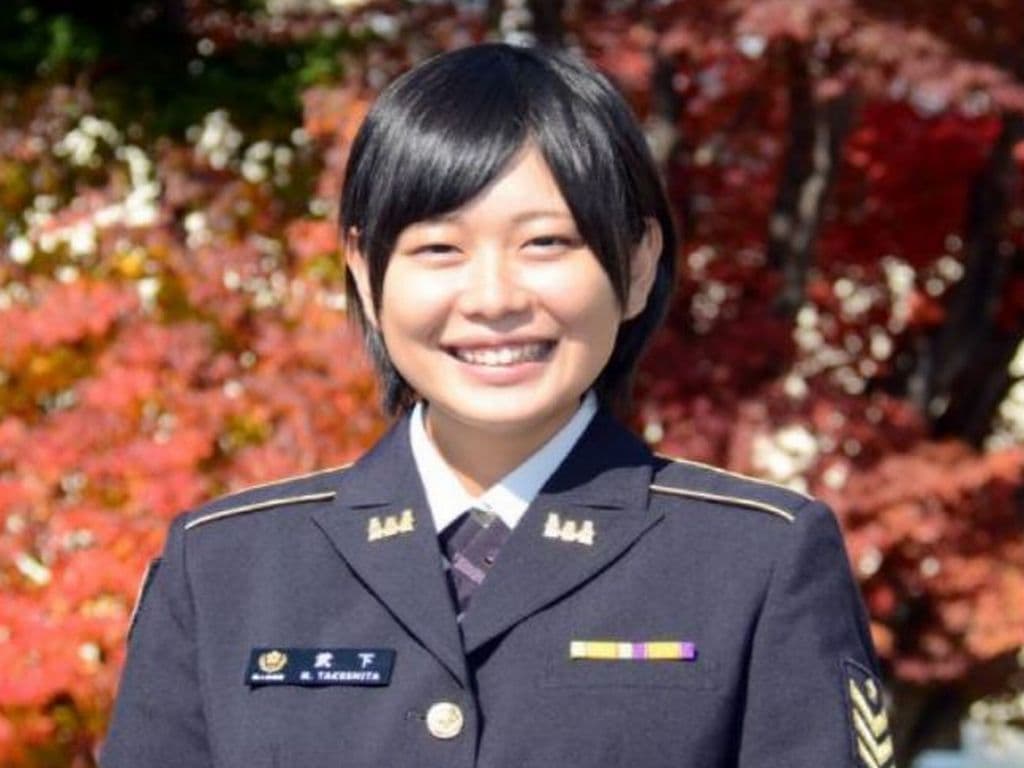凛―シンガポールに立った一人の若き女性 二木可南子の物語
The smile of this young officer reflects both dignity and hope for the future. Beyond the turmoil of war, the spirit of Yamato Nadeshiko lives on, inspiring Japanese women with courage and pride.

A young female officer in uniform smiling against a backdrop of vivid autumn leaves, symbolizing dignity, resilience, and hope for the future.
Taoyaka ni, Yamato-nadeshiko saki ni keri —
rin to kedakaku, taji rogi mo sezu.
Softly, the Yamato-nadeshiko blooms —
upright and noble, she does not flinch.
This is a true story preserved by the writer Shin Hasegawa (author of Kutsukake Tokijirō, Ippon-gatana Dohyō-iri). In his Nihon Horyo-shi (“A Record of Japanese Prisoners”), he introduced a young woman named Kanako Futaki. What follows is a retelling in contemporary English, with an afterword.
Introduction — A Flower That Did Not Tremble
At the end of the war, Kanako Futaki was twenty by the old Japanese count—nineteen in today’s terms.
Born and raised in London to a shopkeeping family, she spoke polished English. When her mother passed away, her father Tadasuke Futaki brought his daughter back to Japan. War came; Tadasuke was drafted as an interpreter and attached to the Malayan campaign as an officer-equivalent. Kanako was also drafted. She asked for one condition—to serve where her father was—and was assigned to the Army Medical Department in Singapore as a typist/translator, one of only four young women among some six hundred technical staff.
When surrender came, the British would soon arrive to take control of the hospital and stores. The department needed those four English-typing women to remain; the risk for them, however, was real. A military doctor, summoning his courage, approached Kanako.
“I am asking the other three as well,” he began awkwardly, “but would you consider staying?”
“I will be glad to stay,” she answered at once.
The doctor blinked.
“My father is not in Tokyo,” she explained. “He and I lost contact months ago.”
The doctor remembered: her father had been transferred to a dangerous area; news ceased.
Kanako continued, “He told me, just before we lost touch: If one of us must go far, one shall remain here in Singapore. The other will one day come back. We will find each other here. And he also said, Patriotism is not only for victory.”
The doctor bowed his head. “Thank you, Futaki. The work will be hard; please take care.”
Then, after a silence, he added with grave honesty: “Not everyone acts with good intent. If danger draws near, we—at least I—will do everything a human being can do, even at the cost of my life. That is all I can promise.”
Kanako inclined her head. In a low voice she said, “If it comes to that, I will go before you.”
She touched the small vial hidden at her collar.
The doctor bit his lip, stifling a sob that escaped as a single cough.
Note: In the immediate aftermath of war, repatriation routes across regions carried documented risks of sexual violence. Many feared the unthinkable. The restraint here is deliberate: the point is her resolve and the risks she faced, not sensation.
The Handover — Trust, Carefully Grown
September 1. At King Edward VII Hospital, Lt. Col. Harris arrived with 300 armed troops. From behind a curtain, the four women watched with steady hands.
Alongside Harris stood an elderly British physician, Dr. Green. He spoke calmly:
“Japanese colleagues, I do not yet understand your minds. That is why I have brought armed men. As days pass, I hope to reduce their number—and their arms. Will you help me do that?”
His manner was firm yet courteous. Tension eased.
Days later, swords—carefully hidden—were discovered. Dr. Green’s disappointment flared.
“I am saddened to think my trust has been betrayed. If anyone can speak to this, speak now.”
At the doctor’s request, Kanako stepped forward. She did not plead; she explained.
She spoke of the craft—how a sword could be an object of art, of stories in which blades were offered to the sea, of legends in which a sword cut through fear itself. She explained that words travel poorly across languages; that what is threat in one tongue can be memory in another. She sprinkled her English with a hint of London—enough to make the old man’s eyes soften.
The doctor listened, sometimes closing his eyes as if to hear a distant city.
At length, he said quietly, “The found swords will be discarded. I will not pursue who hid them.”
Trust—uneasy, careful—had taken root.
Another day, a British guard made a crude remark to Mihoe Uemura, one of the women. She faced him squarely:
“Are you a guard—or an invader?”
Dr. Green heard of it. To the guard he said, “In your head, is there no entry for lady?” The man asked for transfer and did not show his face again.
Kanako, for her part, gathered the three younger women and gave a short course:
“What it means to carry yourself as a lady—and to be treated as one.”
On the staircase, when an officer came down, the others often stepped aside. Kanako did not. Not from defiance—but from dignity. She would not reduce her own standing. And in time, the officers learned to step aside first.
Changi — Memory and the Name “Futaki”
Why was Dr. Green so measured? He had once been a prisoner in Changi. He remembered the hunger, the illness. He remembered hearing that a memorial to the unknown dead had been raised—honoring both sides. He remembered several Japanese civilians who came, again and again, with food and medicine paid out of their own pockets. He would say later, “We lived because of that. I wanted to answer it someday.”
When the monsoon set in and Dr. Green had to return to London, his successor arrived: Dr. Canning.
On his first day, he read the typed roster of sixty Japanese staff remaining.
“Uemura Mihoe… Morisumi Namiko… Narita Yumiko… and Futaki Kanako?”
“Oh! Futaki—Futaki?”
“Yes,” said Kanako, entering. “Dr. Canning, how may I help you?”
He stared, then caught himself. “Forgive me—this is impertinent—but there is something I hope to find in your face. Do you know Tadasuke Futaki?”
Kanako’s voice did not waver. “He is my father.”
Canning drew a long breath. “I will not forget that name. In 1942, on the railway detail toward Thailand and Burma, there was a Japanese interpreter named Futaki. He did everything he could for the sick and injured. Some said he was an envoy of mercy.”
In 1944, the interpreter named Futaki disappeared. Canning searched. He asked the British, the Americans, the Australians, the Dutch—no one knew. And then, after a thunderstorm had washed the sky clean, a phone call came to Canning’s wife; another from Dr. Green:
“He is alive. The Americans report he is in the Philippines. He will be sent to a destination of his choosing.”
Kanako’s smile in that moment—to Canning it was “an Eastern bloom.”
She remained in Singapore until her father arrived. They met again on that same shore.
After the Storm — A Misunderstanding, and Its Answer
When repatriation finally began, there was a British staff officer whose decisions angered many Japanese at Jelebu camp. He delayed women’s embarkation while letting men go. Monsoon winds rose; ships ceased coming; resentment grew. Even when one ship appeared, again no women were allowed to board.
At last, a transport docked at Tanjong Pagar. Women and children were finally permitted. Boarding with a full measure of indignation, they were met on the pier by the same officer who had caused it all.
He spoke quietly:
“You have every reason to resent me. But this mattered more to me: that when you finally go home, you go with as much comfort and dignity as possible. Every time a ship came in, I inspected it personally. I checked the place that most concerned me—the lavatories for women. Only when those were properly made did I agree to embarkation. I would not cram you into a wartime transport and leave you to indignity and discomfort.”
Faces changed—resentment melting into understanding.
As the ship drew away, a voice began “Auld Lang Syne.”
Soon sixty women were singing. British soldiers stood at the quay until the ship’s shadow faded.
Some would say the officer’s respect had been shaped, in no small part, by Kanako Futaki—by the way she stood, and the quiet lessons she taught others to stand.
Epilogue — Rin
Taoyaka ni, Yamato-nadeshiko saki ni keri —
rin to kedakaku, taji rogi mo sezu.
In the end, Kanako did not win a battle.
She did something harder: she upheld dignity when it would have been easier to despair.
She met severity with composure, fear with clarity, anger with explanation—and turned suspicion into trust.
Her father once said, “Patriotism is not only for victory.”
Perhaps that is why her poise could outlast the chaos and let two sides see each other—at last—as human.
[Author’s Note]
This story is not about perfect nations or perfect times. It is about individual choices—by a young woman, two British doctors, a meticulous officer, and a father who served the powerless. In every age, weapons change; what endures is the way we treat those who are vulnerable. Dignity, once shown, invites dignity in return.
Translator’s/Editor’s Notes
• Names follow the order Given name → Family name for readability (Kanako Futaki / Tadasuke Futaki).
• “Changi” refers to the Changi Prison complex in Singapore.
• The account is based on Shin Hasegawa’s Nihon Horyo-shi; minor details are smoothed for narrative flow.


